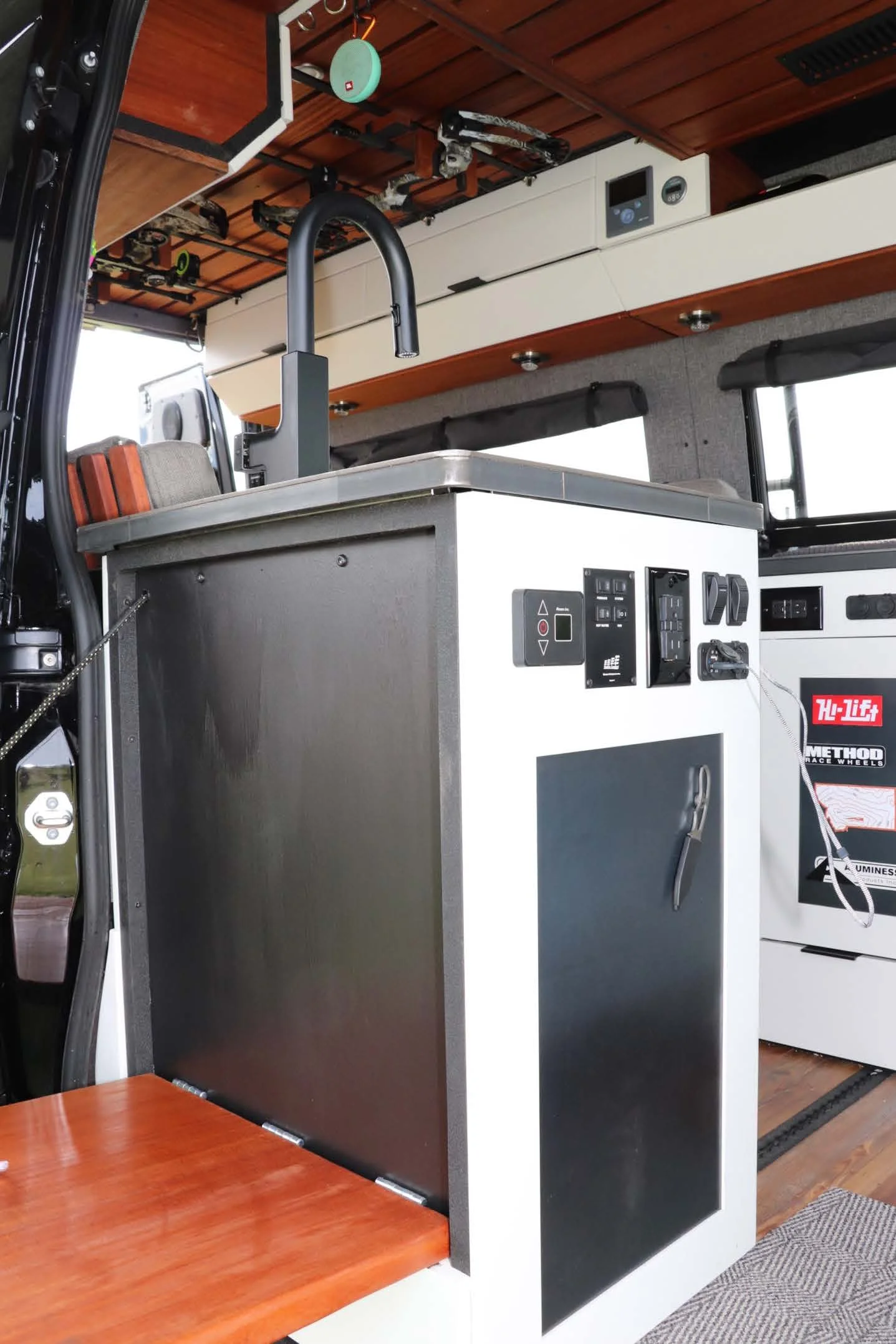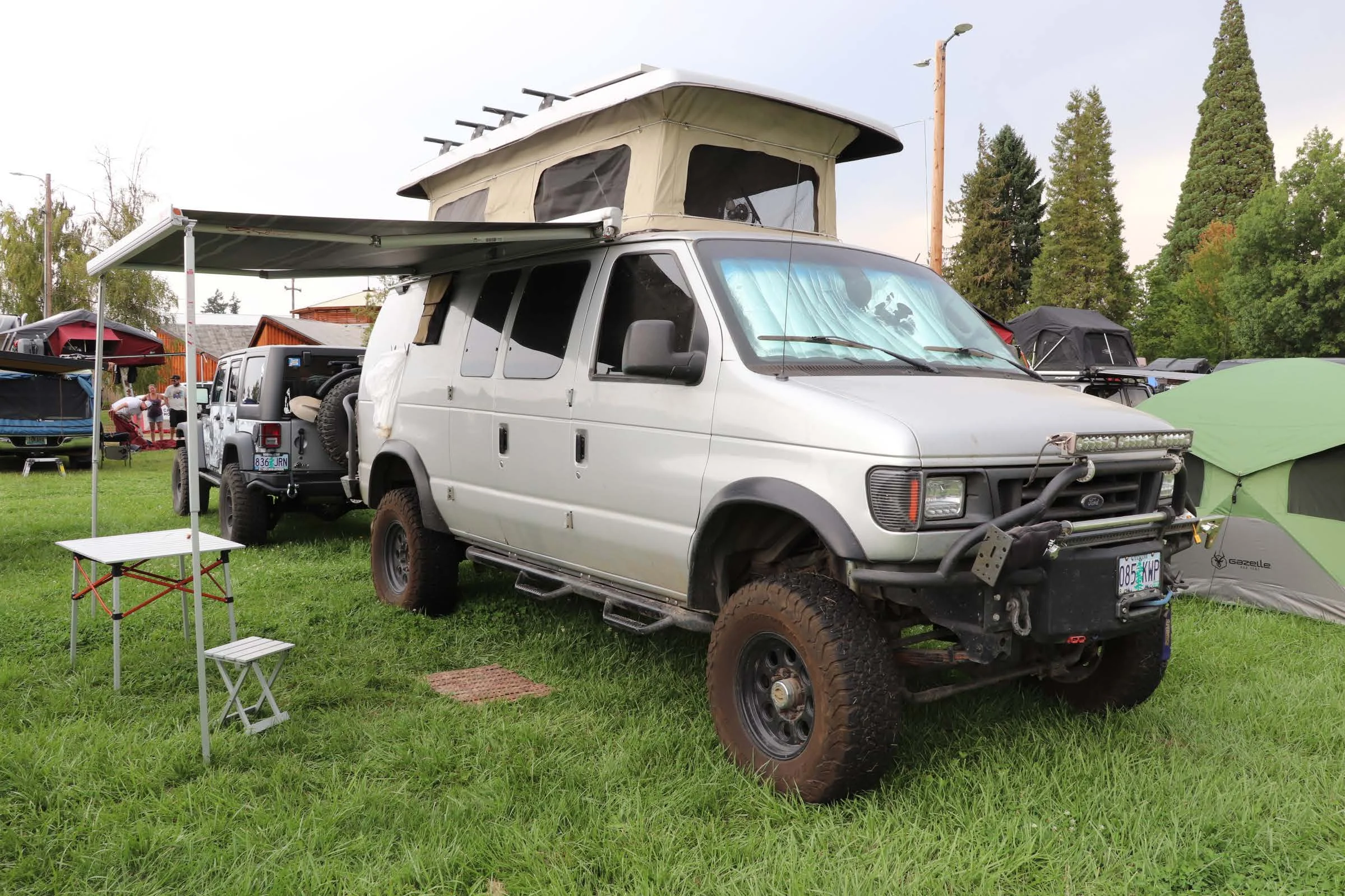Living in a van is an exciting and liberating experience which comes with its own challenges. One significant hurdle to overcome is how to get rid of the water from sinks, showers, and the laundry. Proper unwanted water disposal is critical for the environment and personal hygiene. Fortunately, there are several options for ridding refuse when living in a house on wheels.
In this article, you'll learn about different methods for collecting, storing and disposing of it safely and efficiently at designated dump stations or campgrounds. Additionally, we'll cover tips for minimizing production and reusing your water whenever possible. With these guidelines in mind, you can enjoy the freedom of living on the road without fouling your fresh water, sacrificing proper hygiene or harming the environment.
Understanding Greywater
Understanding greywater is important when living in a van, where its contents and the benefits of gently used water from everyday activities differs from black water. Greywater comes from an RV kitchen sink, wash water and laundry, and it contains traces of dirt, food, grease, hair and cleaning agents. It's relatively clean compared to black water that comes from toilets.

Where are you going to dispose of your grey waste?
When living in a house on wheels, you need to have a disposal plan. Most vans come with a built-in holding vessel where it can be stored until you find an appropriate place to dispose of it safely. Some campsites have designated dump stations where you can empty your holding reservoir easily. However, if these facilities are not available or accessible for you when living on the road, there are other options available.
One option is to use soap that won't harm the environment during disposal. Some van lifers use this type of soap in combination with a portable container they keep inside their van which they can empty later on into designated facilities or areas that allow safe dispersal of unwanted water without harming plants or creatures' habitats.
Understanding what grey water is and how it differs from black water is essential when living in a van. There are various ways to dispose of water safely even if dump stations are unavailable: using biodegradable soap and carrying a portable container for temporary storage until reaching proper dumping sites or areas where it won't cause any harm. In the next section about collection and storage, we'll discuss ways to collect and store this valuable resource efficiently while on the road.

Van life requires a thorough understanding of system maintenance.
Greywater Collection and Storage
When camping, it's crucial to have an efficient system for collection and storage, whether that's using portable containers or custom-built tanks as part of your plumbing system. A receptacle is a popular choice among vanlifers because it allows for easy storage and disposal from bathroom sinks and showers. Holding tanks come in different sizes and shapes, so you can choose one that fits your specific needs. Additionally, some tanks have features like built-in sensors that alert you when the container is full.
These greywater systems are not only beneficial to the environment but will also save money in the long term. Conversely, improper disposal can lead to health hazards, environmental pollution and harmful contaminants. To prevent this, make sure to follow local regulations and guidelines for disposal. You can also use eco-friendly products like soap that minimizes harm to the environment.
When choosing a disposal method, consider factors like space constraints and ease of use. For example, if you have limited space in your van, a portable container may be more suitable than a custom-built containment and greywater system. Alternatively, if you plan on spending extended periods camping, investing in a larger water tank may be necessary.
Observing proper hygiene practices is just as important as having an efficient greywater system. Make sure to regularly drain your tank to prevent bacteria buildup and foul odors. By taking care of your system properly, you'll ensure that it functions effectively throughout your travels while minimizing negative impacts on both yourself and the environment around you.
Observing Proper Hygiene
Proper hygiene is essential for maintaining a safe and healthy system while on the road. Don't avoid routine cleaning to avoid unwanted pathogens or foul odors. In your travels, it's important to keep your tank clean and sanitized to prevent the growth of harmful bacteria. The following table provides some tips on how to properly drain and sanitize your van's tank.
Action
Frequency
- Drain the grey water tank every 2-3 days
- Flushing with hot water once a week
- Using biodegradable soap
As Needed
Sanitizing with vinegar or bleach solution every month*
*Note: Always rinse thoroughly after sanitizing with bleach solution.
Proper maintenance is key with any system. Neglecting it can lead to unpleasant smells, clogged pipes and health hazards just as it would if you had a septic system at home. To ensure that you're acting safely and responsibly, be sure to follow these guidelines:
1) Only use soap and detergent that won't harm the environment.
2) Avoid dumping within 200 feet of any fresh water source such as lakes or streams.
3) Never drain in areas where people gather or near campsites to minimize contact.
4) Dispose of water only at designated stations whenever possible.
By following these steps, you'll help protect the environment and keep yourself safe from harmful bacteria. In the next section, we'll cover disposal at stations without causing harm to others around you.
Disposing of Greywater at Designated Stations
To ensure safe, responsible disposal while on the road, it's essential to know how to do it at the appropriate stations. These facilities are expressly designed for RV and van water disposal and can be found at campgrounds, rest areas and truck stops. Dump stations are an excellent option for emptying your tank because they provide a safe way to eliminate debris without harming the environment.
To use a station, you will need to locate one near you using online resources or mobile apps. Once you have located a dump station, make sure to follow the facility's guidelines or campground staff. Most dump stations require a small fee or donation for use; however, some may be free. When using these facilities, make sure to empty it only in designated areas as dumping anywhere else may harm the environment.
Before heading out on a trip in your van, consider investing in a portable holding tank if your vehicle does not already have one installed. This type of tank collects and stores water from sinks, showers, and other appliances until you reach a designated dump station where it can be emptied safely. By using this method combined with designated dump stations' services, you can reduce pollution while also ensuring that all wastewater is disposed of appropriately.
In conclusion, knowing where to dump is critical when on the road. Using dump stations is an excellent way to unload your tanks without harming the environment. If no such facility exists nearby or if they charge too much for their services, keep reading.
In our next section about water disposal at campgrounds, we'll explore alternative methods that might work better depending on your situation.
Disposing of Greywater at Campgrounds
As you explore different campgrounds in your van, knowing how to dispose of unwanted matter is essential. Luckily, many campgrounds provide disposal services. These facilities typically include a dumping station where you can flush your tanks.
Before jettisoning your debris, check the facility's rules and guidelines. Some may only allow black water disposal, while others may have specific areas for each. It's important to follow these rules to avoid contaminating the environment and causing harm to living things.
At a campground, disposal requires locating the dumping area and using a sewer hose in the dumping hole. First, drain the black water tank before hooking up the sewer hose to the grey tank's valve and opening it. This will flush your sewer hose with cleaner water and clear any solids that may have been left behind.
When living in a van, having a reliable system for water management is key. Campground disposal facilities are an excellent option for getting rid of wastewater while on the road. In addition to utilizing these amenities, it's essential to be mindful of where you dump when camping in more remote locations such as wilderness areas or national forests.

Reliable water management systems are a van life necessity.
Disposing of Greywater in the Wilderness
When camping in the wilderness, it's important to know how disposal works without harm to the environment. If you're living in a van, you likely have a tank that needs to be emptied regularly. One option is to find designated dump stations along the way or near campgrounds. When overlanding without access to these facilities, scattering waste water may be the best solution.
To scatter, start by finding an area at least 200 feet away from water sources like rivers or streams. Look for dry soil with minimal vegetation and dig a hole about 6 inches deep. Slowly pour out the material into the hole while being careful not to spill or splash it around. Cover up the hole with soil when finished and avoid using the same place for a few days.
When engaging in wilderness disposal, it's important to use biodegradable soaps and cleansers to minimize harm to fauna and their habitats. Avoid using bleach or other harsh chemicals that can damage plants and animals. In addition, make sure the holding tank is properly sealed and secured during travel to prevent leaks or spills on the road.
By observing ways to properly dispose of unwanted water, you can enjoy living off-grid without leaving a negative impact on nature.
Next, we'll learn about evaporation, another safe disposal method in remote areas without harming habitats.
Grey Water Evaporation
Disposing of grey water is problematic, especially while spending time in the wilderness. In the previous subtopic, we discussed water disposal methods in the wilderness. Now, let's explore another option: grey water evaporation.
Grey water evaporation is an effective method for getting rid of grey water during van life. This method involves spreading grey water over a large surface area and allowing it to evaporate naturally without becoming a mosquito breeding grounds. Since van dwellers often have limited space and resources, this method is ideal because it doesn't require special equipment or additional space.
To use this method effectively, you need to plan ahead to select a location that's suitable for evaporation. Look for an area with good sun exposure and low humidity levels. Spread the grey water on a tarp or directly onto the ground, as long as it's not near any water sources or campsites.
Conserving water is crucial in van life, and using this method not only helps get rid of grey water but also reduces overall water usage. However, it's important to note that this method should only be used if the grey water holding tank has been emptied properly.
In summary, grey water evaporation is an effective means of disposal when living in a van. It's easy to do and requires minimal resources while also promoting water conservation.
Next up, let's explore ways to reuse grey water instead of just getting rid of it, which can save even more water.
Reusing Grey Water
Looking for ways to repurpose the water from your sink, shower and washing machine in order to conserve water and be more sustainable in van life? Let's explore methods for using stored grey water. Reusing grey water is a way to conserve water and reduce the amount of waste produced in a van. You'll be surprised how much water it takes to flush your toilet, shower, clean outdoor gear, or even water plants.
One option for reusing grey water is to collect it in a separate tank and then use it as needed. This requires installing a grey water system in your van and may require some plumbing work. However, if you're handy with tools, this can be a great DIY project that will save you money in the long run.
Another option for reusing grey water is to filter it through a series of natural materials such as sand or gravel before using it. This method removes any contaminants from the grey water and makes it safe for reuse. However, this method requires more space than simply collecting the water in a tank.
No matter which method you choose for reusing your grey water, it's important to remember that not all types of grey water are safe for reuse. Water from kitchen sinks should be avoided as it may contain food scraps or grease that could clog up your system. Additionally, make sure to properly throw away excess grey water that cannot be reused.
As you can see, there are many options available when it comes to reusing grey water in your van. Whether you decide to install a tank or filter the water before use, incorporating these methods into your lifestyle can help conserve water and reduce waste production. Next up: tips for minimizing grey water production.
Tips for Minimizing Grey Water Production
To conserve water and minimize waste in your mobile lifestyle, try using biodegradable products, limiting water usage during activities like dishwashing or when you shower, collecting and reusing water from cooking or washing produce, and considering a composting toilet. By taking these steps, you can significantly reduce the amount of greywater that needs to be disposed of when living in a van.
Here are four tips for minimizing greywater production:
- Use biodegradable soaps and cleaning products: These products are less harmful to the environment and make it easier to reuse greywater safely.
- Limit water usage: Turn off the water when not actively rinsing dishes or showering, or use a spray nozzle to control the flow.
- Collect and reuse water: Water used for cooking or washing produce can be reused for cleaning or watering plants, reducing the amount of greywater generated.
- Consider a composting toilet: Composting toilets produce little to no liquid waste, which can significantly reduce greywater production.
Implementing these tips will not only help you minimize your impact on the environment but also save money by reducing your need for frequent greywater disposal while living in a van.
As important as minimizing greywater production is disposing of it properly. In the next section, we'll discuss some best practices for disposing of greywater when living life on the road.
Greywater Disposal Best Practices
Learn how to get rid of your greywater responsibly while on the road by following these best practices. When living in a van, it's important to jettison wastewater properly to avoid polluting the environment and potentially causing harm to yourself or others. One of the first steps is having a grey water tank installed in your van. This will allow you to collect and store grey water until you can dump it at an appropriate location.
To ensure greywater disposal safety, follow these best practices:
Best Practices
- Follow local regulations
- Rules may vary by location. Do the research and comply with disposal guidelines
- Avoid fines and penalties and protect the environment
- Dump in designated areas only
- Look for dump stations or designated areas for proper grey water disposal
- Do not dump near water sources or ecologically sensitive areas
- Avoid polluting natural resources and prevent harm to wildlife
- Keep your tank clean and it will require very little maintenance
- Regularly clean and maintain your grey water tank to prevent odors and contamination
- Ensure proper functioning of system to avoid health hazards
- Plan ahead of time for stops at appropriate disposal locations along the way
- Avoid being caught without a place to dump and reduce stress and anxiety
By following these best practices for greywater disposal when living in a van, you can minimize negative impacts on the environment while keeping both yourself and others safe. Proper management of wastewater is crucial for maintaining a sustainable lifestyle on-the-go during van life. Remember that responsible use and disposal of resources is key in preserving our planet's natural beauty for future generations.
Frequently Asked Questions
Can I use greywater for drinking or cooking purposes?
Using greywater for drinking or cooking purposes is not recommended. While greywater may be safe and beneficial for yard irrigation, it is not suitable for human consumption due to the traces of dirt, food, grease, hair and cleaning products contained within. Instead, greywater can be designated for indoor use, fruit trees or some vegetables in your backyard ecosystem. By doing so, you'll be contributing to a longer-lasting and less maintenance-intensive garden as well as reconnecting to the natural water cycle. Remember: keep it simple and match the amount with your plant needs. Stay resourceful and adaptable in making the most of what you have available without compromising on health or safety.
Is it safe to throw out greywater in a regular trash bin?
Disposing of greywater in a regular trash bin is not recommended as it can harm the environment and potentially contaminate groundwater sources. Greywater contains traces of dirt, food, grease, hair, and cleaning products that can be harmful if not properly treated before disposal. It is important to follow guidelines for safe disposal, such as infiltrating into the ground or using constructed wetlands. Additionally, it is crucial to avoid contact with feces and toxic body products. To ensure responsible grey water management, seek advice from technical forums or organizations such as Greywater Action and consider alternative options like composting toilets or portable filtration systems when living in a van. Responsible greywater disposition contributes to a more sustainable water culture and increases everyone's freedom to explore without harming the environment.
How do I prevent greywater from attracting pests and insects?
Preventing pests and insects from being attracted to your greywater can be easily done by following a few simple steps. Firstly, ensure that any food particles or grease are not present in the water as they tend to attract insects. Secondly, do not allow the greywater to sit for more than 24 hours as stagnant water is a breeding ground for mosquitoes. Thirdly, use plant-based soap products that are less likely to attract pests. Lastly, consider using essential oils like lavender or peppermint in your greywater to repel insects naturally. By taking these precautions, you will be able to enjoy the benefits of using greywater without worrying about attracting unwanted guests.
Can I use grey water to wash my body or clothes?
Yes, you can use grey water to wash your body or clothes if you follow some basic guidelines. Grey water is safe for irrigation and contains traces of dirt, food, grease, hair, and cleaning products. However, it's important to avoid contact with feces and toxic body products. You should also minimize storage time to 24 hours or less and match the amount used with plant needs. Indoor reuse options like Catch in buckets for toilet flushing or outdoor use are available as well. By using grey water for washing your body or clothes, you can save most water and reduce pollution while reconnecting to the natural water cycle and increasing backyard ecosystem productivity.
What are the legal implications of disposing of grey water improperly?
Improper disposal of grey water can have serious legal implications. It's like driving a car without proper registration or insurance; you may not get caught right away, but the consequences could be severe if you do. Depending on where you are, dumping grey water on the ground or in storm drains could result in fines and even criminal charges. It's important to know the regulations in the area and discard grey water properly to avoid any legal issues. As someone who values freedom and independence, it's important to take responsibility for your actions and make sure you're following the rules when it comes to grey water disposal.
Conclusion
Congratulations on learning about the different options for how to get rid of grey water in your van. Now you can safely and responsibly dump it while minimizing your impact on the environment.
As you navigate life on the road, remember to always observe proper hygiene practices and follow guidelines for disposing of greywater at designated dump stations or campgrounds. Consider using simple systems for collection and storage, evaporation or even reuse for irrigation.
Remember, every little step counts when it comes to reducing water waste and pollution. So be resourceful and adaptable in finding ways to minimize your production of greywater as well as properly disposing of it. Whether you're parked by a serene lake or driving through a bustling city, take pride in knowing that you're doing your part to protect our planet.

Responsible resource management begins with you.
